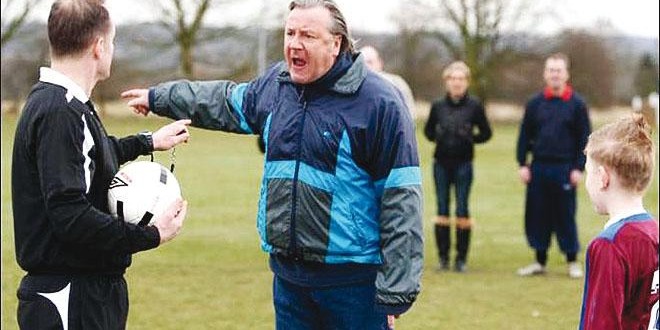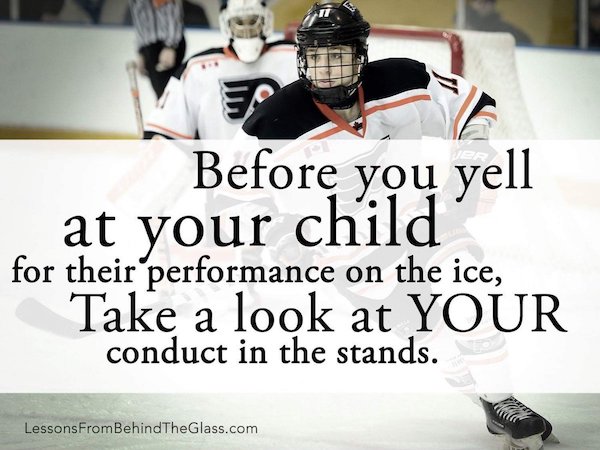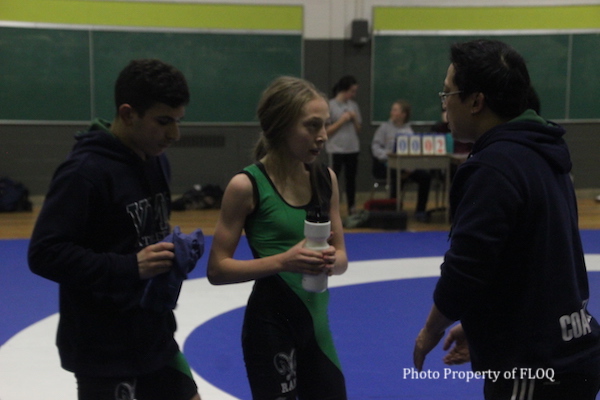Wednesday January 30th 2019
Normally in the blog, I like to speak about things that are more positive in nature. The blog has been a place that I’ve used to share my experiences and to give my opinions on what’s going on with our sport. I try not to be negative as I feel that there’s enough of that in our world. I try to see both sides of the argument and not be overly biased about certain subjects. As a result, I’ve usually tried to avoid more controversial topics when writing in my blog so as to avoid negativity. However, sometimes I feel that there’s a need to shakeup the status quo and once in a while I’ll choose a topic that can lean more on the controversial side. Therefore in this blog, I’ve chosen to write about parents and their involvement in their kid’s sports.
To be clear, this is not an article designed to vilify parental involvement, nor is it one to say that all parents are the same when it comes to their children and sport. Many of the interactions I’ve had with parents have been very positive and I’ve received in turn a great deal of support throughout the years. Rather this article was written to show the most negative aspects that I’ve either seen or experienced when throughout my many years of coaching. This is also not to point fingers either. Instead I would rather that the parents that read this article use it like an objective way to self-analyse themselves and improve. Try to focus on the positive aspects rather than just the parts they feel that don’t portray them in the best light. With that being said, let us proceed on the types of parents I’ve seen throughout the many years.
The “Expert Parent”
As coaches we’ve all seen that parent who thinks that they are a self-appointed expert of their child’s sport. How many times have we seen a child go back after a match or game, only to either have feedback or criticism given out on them. I’m not saying that parent’s should not offer up some feedback to their child’s performance. When parents do, this often shows that they are involved and that they care about their child participating in sport and that can only be a good thing. The part that I’m focusing on is when a parent steps in as another coach and even worst, contradicts the coach. If the parent is an expert in the sport, then some feedback is warranted. However, if they are an expert then they should also allow the coach to do their work without undermining them as there was clearly a reason as to why they brought their child to said coach. Even worst than that is when a parent steps in as a coach and contradicts them without any knowledge of the sport whatsoever. This sends very mixed signals to the athlete and will create tension and hinder development. As coaches or parents, this is definitely something that we don’t want to see.
I remember speaking to my coach Victor Zilberman many years ago about this subject. One of the things that he remembered that was throughout all the years that I wrestled as well as all the tournaments that my father drove me to, not once did he offer any advice or feedback. He was there when I needed him but he allowed the coaches to do their work. Having never wrestled probably contributed to this but when has that ever stopped the “Expert Parent” from contributing their two cents worth? When asked about this by Victor after I retired, my father basically said that as a parent, his job was to support me but it was the coach’s job to coach. We can clearly take some lessons from this.

From my days of coaching soccer, I’ve seen a lot of this (Photo Property of discoversoccer.info)
The “Aggressive Parent”
Throughout the years, many of us have been an unfortunate witness to this. The aggressive parent in sport is nothing new and can take on many characteristics. The aggressive parent can manifest itself as the parent sitting in the stands who displays vulgar or aggressive behaviour to either their child’s opponent, the coach, the referees or even other parents. We’ve all sadly seen the image of the parent in the hockey stands or on the soccer pitch getting worked up over some trivialities, thereby adding fuel to the fire and turning an otherwise fun event into a battlefield.
The aggressive parents can also show themselves when confronting a coach or other parent. Sadly another image that we’re familiar with is the parent coming aggressively at someone else. They often feel that their actions are justified but I have to wonder how these parents would react if they saw themselves from the outside? Would seeing themselves as an outside observer change the way they act or are they beyond help? An aggressive parent can serve as a negative role model for younger athletes. Worst of all, it won’t change the situation, but merely escalate it.
I remember when I was wrestling a tournament in Vermont. The tournament itself didn’t have that many wrestlers but it was an important one as it was one of the three State qualifier tournaments. I don’t know how it is now but at that time, wrestlers wishing to participate in the State Championships had to place in the top three of one of the State qualifiers in their region to wrestle in the State championships. Canadians were allowed to wrestle but obviously not qualify for State championships. My final match had me against a fairly tough opponent but I was able to get the win comfortably. After shaking the coaches hand, I happened to see my opponent and his coach get into a shouting match. It quickly escalated to the point where they were in an actual fistfight! At which point, I saw people who I assume were the parent’s jump in to separate the combatants. Instead of trying to calm the situation, both parents started to yell at the coach and the athlete! I later found out that they were all the same family, and that the older brother was the coach. I also found out that this is not the first time the parents have jumped into an altercation with either another coach or other parents. The fact that this was said so casually by those who told me, seemed to indicate that this aggressive behaviour was not only a common occurrence with these people, but that it was more or less accepted. Maybe it’s just me, but I was shocked to say the least. The fact that this behaviour was considered acceptable or at the very least tolerated would seem to indicate a bigger problem.

As Canadians, we’ve all seen this unfortunately
(Photo Property LessonFromBehindTheGlass.com)
The “Well-Intentioned Parent”
This one above all else is probably the most difficult one. What I define as the “Well-Intentioned” parent is the parent that has their child’s best interest at heart but manifests this concern in a strong way that can hinder the progress of the athlete. Allow me to explain. The Well-Intentioned parent supports their child in their participation of a sport, supports the coach and generally doesn’t come across as much trouble for the most part. Sometimes a parent may be a silent partner as you the coach, and you may rarely or never even hear from them. However, if something does go wrong, this is where the trouble occurs. From what I’ve seen over the years, the Well-Intentioned parent will react quite strongly if something goes wrong with their child. Whether it’s an injury, their child not making a team or even not winning a tournament, their reaction is very strong. They will often try to spare their children any sort of heartache and will often try to remove them from the sport to accomplish this. This reaction is extreme and though borne from good intentions, is ultimately the wrong one. While some people may argue with me, I feel that they should hear me out.
We all want to spare our loved ones heart break and pain as it hurts us to see them in distress. Sometimes this distress can hurt us just as much as it hurts them and it’s in our nature to want to protect them. While these instincts are natural, I feel that in some ways we’ve gone too far as a society. Life is full of obstacles and many of them we won’t be able to conquer. This failure on our part may cause varying levels of distress, some of which we may not be able to get away from. We need to face our failures and disappointments head-on and use the tools and experience that we’ve acquired throughout the years to cope with this. By removing your children from that difficult situation, you are doing them a disservice as you are effectively sending them the message that when things get tough, it’s okay to quit. Sometimes the situation may be so extraordinary, that the only solution is to walk away but the Well-Intentioned parent will use that as crutch every single time rather than weighing out all the options. In other words, quitting and pulling them from the sport is always the first answer rather than the last resort.
Throughout my many years of coaching, I’ve seen this and it doesn’t get easier as time goes on. When things are going well, you are held in great esteem by the parent but when the slightest obstacle comes about, then you’re the villain. It’s almost like being stabbed in the back as the parents in their anger and frustration, turn on you, as you are the closest target. Worse yet, by pulling their kids out of the sport, they do them a great disservice as they not only take them away from something they love, but deny them the chance to confront a personal obstacle head-on. I think that this will never change as parents like this are all over the place. I would instead encourage parents to think things out first rather than have a knee-jerk reaction and make a decision that will result in hurt feelings all around. I think in general, this is good advice for anything.

Sometimes the hardest thing is to just let the coach and the athlete do their thing
Looking forward
I am not a parent and as such, I don’t know how I would react if I was put into any of the situations that I mentioned. It could be that I might be just as bad as some of the parents that I described. Parental involvement is critical to an athlete’s success and though it may be difficult, parents have to trust in the coach and take a backseat from time to time. Allow your kids to struggle and though it may be hard for them in the short term, they will become better adults for it. Let the coach and the athlete do their thing with minimal interference but be there to help and support your child when needed. Last but not least, learn to look at yourself objectively and without a closed mind and hopefully if any of the aforementioned situations describe you, then try your best to modify some of the more negative aspects for the betterment of your child’s participation in sport.
